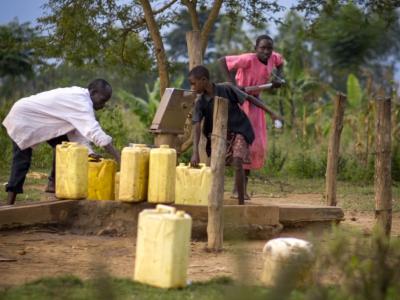Agriculture is a crucial sector in Uganda, accounting for approximately 21.9 percent of its GDP, 85 percent of its export earnings, and 68 percent of total employment. The country is experiencing the effects of climate change including increased temperatures, frequent disease and insect infestations, disrupted rainfall patterns, and frequent floods, droughts and extreme weather events. This has severe impacts on agriculture, making the sector highly vulnerable to climate change.
Poor farmers – especially those already vulnerable, such as women and youth - who lack education, access to resources, and tend to rely on one crop for their income, are most affected by the impacts of climate change. To address these issues, Uganda is building capacities at national and sub-national levels to prioritise and implement gender-responsive climate change adaptation strategies.
Implementing agencies and partnering organizations:- United Nations Development Programme (UNDP)
- Food and Agriculture Organization of the United Nations (FAO)
- Federal Ministry for the Environment, Nature Conservation and Nuclear Safety (BMU)

Adaptation policies
The Climate Change Task Force, established by the Ministry of Agriculture, Animal Industries and Fisheries (MAAIF), with guidance from the Climate Change Department (CCD) of the Ministry of Water and Environment (MWE) and technical support from FAO and UNDP, led the preparation of the country’s National Adaptation Plan (NAP) framework for the agricultural sectors (also called NAP-Ag). In 2016 the NAP-Ag Framework was finalised, the adaptation strategies were contextualised into different agro-ecological zones, and was then validated by local governments and stakeholders. An investment framework is also being developed to support the implementation of the NAP for the agricultural sector. The NAP-Ag Framework should be officially endorsed by the government and launched in 2018.
Another key event in 2016, considered to be the most important policy instrument underpinning the NAP-Ag objectives, was the budget circular call (BCC) issued by the Ministry of Finance, Planning and Economic Development (MoFPED), requiring the mandatory mainstreaming of gender and climate change into all sectoral budget framework papers and district local government plans, starting with fiscal year of 2017/18.
NAP-Ag activities
Some of the highlights of NAP-Ag work in Uganda include the formulation of an Agricultural NAP taking into account: disaster risk reduction and gender-sensitive adaptation planning; sensitization of technical staff and public service providers on NAPs; and training and stock-taking of decision tools for prioritizing investment options and assessing climate impact.
Development of an investment framework
Create an investment framework to finance the activities prioritized in the NAP-Ag, engaging with a broad range of stakeholders at all levels.
Enhanced capacities of government to utilise project evaluation and appraisal methods
Develop capacities of national and sector decision-makers to rank and appraise adaptation options, using tools such as multi-criteria assessment, cost-benefit analysis and impact evaluation, adaptation strategies can be prioritised, allowing the most effective and feasible to be adopted.
Boosted capacity for gender mainstreaming through technical training workshops
Technical training workshops are boosting capacity for gender mainstreaming, in addition, analytical methods for collecting and using sex-disaggregated data within impact evaluations, monitoring and value chain analysis, are being piloted.
Preparation for a NAP for the agricultural sector
A NAP for the agricultural sector has been prepared and validated and is subject to a national launch with all relevant stakeholders. Six districts in the central cattle corridor were supported in identifying priority areas and actions for mainstreaming climate change in their District Development Plans.
Development of a Performance Monitoring and Evaluation (M&E) Framework for the NAP for Agriculture
This framework identifies a results-based M&E System and budget for the M&E of the NAP for the agricultural sector.
Gender mainstreaming capacity needs assessment and stocktaking resulted in trainings in February and March 2017
Parliamentarians, central government planners, district-level planners and non-state actors participated in the coaching sessions. These led to enhanced capacity to advocate for gender analysis and mainstream gender in plans and climate change adaptation projects in the agricultural sectors.
Country-specific impact evaluations will be carried out
This will inform decision-making around agriculture and adaptation. Sectoral and local-level stakeholders will also be trained on the climate-resilient gender-responsive market development tool.




